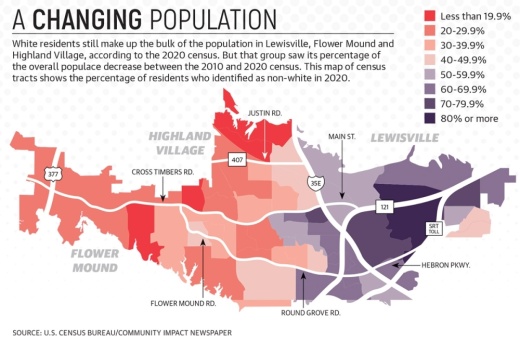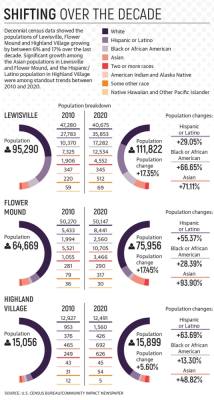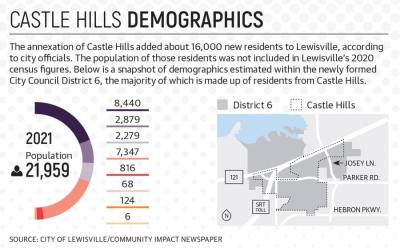Lewisville was home to 111,822 people in 2020, an increase of more than 17% since 2010, according to the U.S. Census Bureau. However, this number does not include the roughly 16,000 new residents added via the Nov. 15 annexation of Castle Hills, which city officials say puts Lewisville’s population closer to 127,000.
Diversity has been a hallmark of Lewisville for many years, Mayor TJ Gilmore said. But the city’s racial and ethnic mix has intensified as people of all backgrounds flock to Lewisville due to its strategic position in the region, he said.
“We’ve had a massive population growth,” Gilmore said. “Lewisville is centered in the metroplex; you can get about anywhere within 40 minutes. [We are] right next to DFW [International] Airport and have lots of different housing choices.”
According to the census bureau, cities with populations of 50,000 or more grew at a faster pace in the South than in any other region. Since the last census, the population in these cities grew by about 12%, per the bureau.
Flower Mound and Highland Village grew by 17% and 6%, respectively. White residents still represent the largest racial group in both areas; however, their share of the total population there decreased between 2010 and 2020, per the census data.
In response to this diversification, leaders in the region are working not only to build in-roads with residents of all races but also to leverage diversity as a tool to further the economic interests of the region.
Denton County Commissioner Bobbie Mitchell, who is a former mayor of Lewisville where she has lived for 40 years, said the region’s diversity is essential to its success on a national and global stage.
“We all bring to the table different experiences,” she said. “Putting all of those experiences together, we come out with a great product.”
Addressing diversity
One of the most significant changes in racial demographics revealed through the census was within the Asian community, which grew by roughly 71% in Lewisville, 94% in Flower Mound and 49% in Highland Village.
Some of this increase is tied to the area’s Chin population, Lewisville City Council Member Bob Troyer said. The Chin people fled religious persecution in the southeast Asian country of Myanmar and began resettling in the Lewisville area in the late 1980s, he said. About 5,000 Chin residents are in the city, he said.
“[Chin residents] move here because [Lewisville is] welcoming and also because their family finds that they can start a business here,” Troyer said.
In 2011, Lewisville ISD launched an annual Chin Festival. Deputy Superintendent Lori Rapp said the event aims to celebrate Chin culture through traditional song, dance, fashion and cuisine.
“We wanted to give students an opportunity to plan a program and an experience that highlights their culture, and keeps them connected to their culture even though they’re living here in the United States,” she said.
The Chin Festival is one example of the investment LISD has made in its students of all cultures in recent years, Rapp said. The district also has a robust dual language program as well as fine arts, and career and technical education offerings that attract students from a variety of backgrounds.
“We are a very diverse district, and we meet the needs of our families and students in a variety of ways,” Rapp said, noting that 86 languages are spoken in LISD. “One of the ways you do that is that you understand that each community is unique, and you allow schools to really understand their parents and their communities.”
In 2015, the district formed a Diversity Council with parents and community members from different cultures who meet with staff several times a year to provide feedback on ways the district can be more inclusive.
“The purpose is to keep a conversation going and allow for staff to learn about perspectives and experiences in the school district,” Rapp said.
Work at the municipal level
In the wake of the death of George Floyd in 2020, former Lewisville Mayor Rudy Durham established the Listen Learn Lead committee.
The goal was to hear directly from the African-American and Black community about ways the city could improve upon racial equity. The commission came up with 30 recommendations, many of which have already been addressed, Gilmore said.
The Lewisville Police Department made several changes regarding the use of force as a result of the initiative, Chief Kevin Deaver said.
The department tweaked its policies to include de-escalation requirements as well as specific wording about the use of chokeholds, which are not allowed unless the use of deadly force is authorized, Deaver said.
“Everyone has biases,” Deaver said in an email. “We have to ensure those biases do not lead to police actions that are based on those biases. ... There are some dark chapters in the history of policing, and we must acknowledge that and make sure our officers understand how that still affects people today.”
A similar initiative launched in August in Flower Mound. The seven-member All Together Flower Mound commission advises staff on how the town can improve in several areas, including cultural diversity.
“We are hungry for resident engagement,” said JP Walton, the town’s strategic services manager. “If you come and talk about something you want to see, that is something we can work on and figure out.”
Ideas that came out of the commission’s focus groups included reflecting more diversity on the town’s website, making welcome packets available to renters, promoting more non-town events, using message boards for meetings and highlighting cultural events and other activities.
Based on feedback from focus groups, the town is also looking to host a new Celebrating Cultures festival as well as a Holi Festival in March and Diwali Festival in October. Other ideas are related to increasing educational opportunities through the library and expanding National Night Out.
Moving forward
Gilmore said he plans to build on the Listen Learn Lead initiative by starting a Mayor’s Advisory Council that would provide open forums for marginalized and minority groups in Lewisville.
“It’s amazing when you sit people down in a room, and they actually have a conversation,” he said. “Suddenly, a lot of the preconceived assumptions go away.”
Rapp said LISD has made an effort over the past several years to form relationships with historically Black colleges and universities as well as schools with robust bilingual teaching programs. The goal is to recruit staff that reflects the diversity of its students.
“Our [human resources] department is constantly seeking out opportunities to recruit ... and make those connections with colleges and universities who are graduating students with unique teaching backgrounds themselves,” she said.
Mitchell said Denton County has made great strides since she was a young girl growing up in the segregated South.••“There’s always [going to be] racism,” she said. “But if we lay our differences aside and realize that we all bleed red blood, and we all have the same basic needs, we can get along.”







